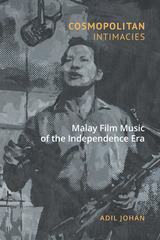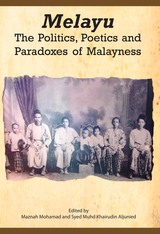3 books about Malays (Asian people)

Cosmopolitan Intimacies
Malay Film Music of the Independence Era
Adil Johan
National University of Singapore Press, 2018
The 1950s and ’60s are now thought to be the Golden Age of Malay film. A big part of what made films of this era so popular was their beguiling music. In this absorbing study, the scholar and musician Adil Johan examines the social and cultural impact of the film music of the period, and its role in nation-making.
Drawing on analyses of lyrics and music, interviews with musicians, and the content of Malay entertainment magazines, in an approach that spans ethnomusicology and cultural studies, he reveals this body of work to be a product of a musical and cultural cosmopolitanism in the service of a nation-making process based on ideas of Malay ethnonationalism, initially fluid but increasingly homogenized over time. Malay film music of the period covertly expressed radical sentiments despite being produced within a commercialized film industry.
Written in a lively style and illustrated with musical examples, the book will satisfy ethnomusicologists, composers, and film studies scholars interested in Southeast Asia and the Malay world. It will equally be of interest to scholars interested in the role of culture in nation-making more broadly.
Drawing on analyses of lyrics and music, interviews with musicians, and the content of Malay entertainment magazines, in an approach that spans ethnomusicology and cultural studies, he reveals this body of work to be a product of a musical and cultural cosmopolitanism in the service of a nation-making process based on ideas of Malay ethnonationalism, initially fluid but increasingly homogenized over time. Malay film music of the period covertly expressed radical sentiments despite being produced within a commercialized film industry.
Written in a lively style and illustrated with musical examples, the book will satisfy ethnomusicologists, composers, and film studies scholars interested in Southeast Asia and the Malay world. It will equally be of interest to scholars interested in the role of culture in nation-making more broadly.
[more]

History of the Malay Kingdom of Patani
Mis Sea#68
Ibrahim Syukri
Ohio University Press, 1985
This translation of Ibrahim Syukri’s Sejarah Kerajaan Melayu Patani (SKMP) makes available a little known but important manuscript published privately ca. 1950 and printed in jawi (Malay written in a modified Arabic script). Shortly after its publication, the book was banned in both Thailand and Malaysia. It appears that a few copies of the original printing survived.
The SKMP represents a valuable contribution to the limited literature available on the Malay population of present-day southern Thailand. While the account of Patani’s history is based on a distinctively Malay interpretation of the record, the SKMP is more important as a political statement of the strong sense of ethnic identity shared by Patani’s Malay population. The SKMP will be of particular interest to those seeking to understand the persistence of conflict in southern Thailand.
The SKMP represents a valuable contribution to the limited literature available on the Malay population of present-day southern Thailand. While the account of Patani’s history is based on a distinctively Malay interpretation of the record, the SKMP is more important as a political statement of the strong sense of ethnic identity shared by Patani’s Malay population. The SKMP will be of particular interest to those seeking to understand the persistence of conflict in southern Thailand.
[more]

Melayu
The Politics, Poetics and Paradoxes of Malayness
Edited by Maznah Mohamad and Syed Muhd Khairudin Aljunied
National University of Singapore Press, 2012
People within the Malay world hold strong but diverse opinions about the meaning of the word Melayu, which can be loosely translated as Malayness. Questions of whether the Filipinos are properly called "Malay", or the Mon-Khmer speaking Orang Asli in Malaysia, can generate heated debates. So too can the question of whether it is appropriate to speak of a kebangsaan Melayu (Malay as nationality) as the basis of membership within an aspiring postcolonial nation-state, a political rather than a cultural community embracing all residents of the Malay states, including the immigrant Chinese and Indian population.
In Melayu: The Politics, Poetics and Paradoxes of Malayness, the contributors examine the checkered, wavering and changeable understanding of the word Melayu by considering hitherto unexplored case studies dealing with use of the term in connection with origins, nations, minority-majority politics, Filipino Malays, Riau Malays, Orang Asli, Straits Chinese literature, women's veiling, vernacular television, social dissent, literary women, and modern Sufism. Taken as a whole, this volume offers a creative approach to the study of Malayness while providing new perspectives to the studies of identity formation and politics of ethnicity that have wider implications beyond the Southeast Asian region.
In Melayu: The Politics, Poetics and Paradoxes of Malayness, the contributors examine the checkered, wavering and changeable understanding of the word Melayu by considering hitherto unexplored case studies dealing with use of the term in connection with origins, nations, minority-majority politics, Filipino Malays, Riau Malays, Orang Asli, Straits Chinese literature, women's veiling, vernacular television, social dissent, literary women, and modern Sufism. Taken as a whole, this volume offers a creative approach to the study of Malayness while providing new perspectives to the studies of identity formation and politics of ethnicity that have wider implications beyond the Southeast Asian region.
[more]
READERS
Browse our collection.
PUBLISHERS
See BiblioVault's publisher services.
STUDENT SERVICES
Files for college accessibility offices.
UChicago Accessibility Resources
home | accessibility | search | about | contact us
BiblioVault ® 2001 - 2024
The University of Chicago Press









